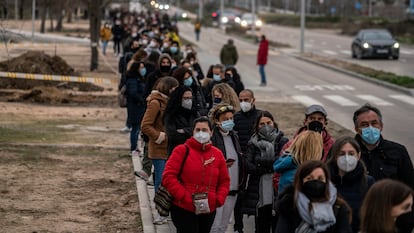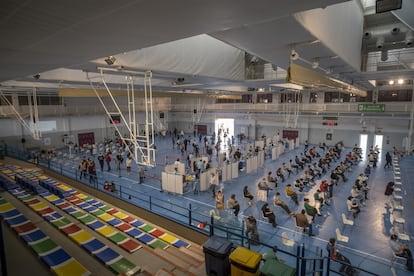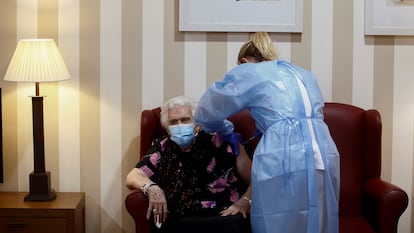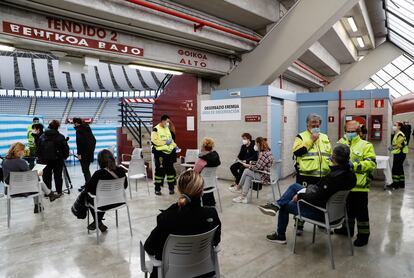How is Spain’s Covid vaccination campaign going in each region, and who is next on the list?
The inoculations are moving forward at different speeds from territory to territory, but the objective remains reaching 70% of the population by the summer


Spain has ended the first two months of its Covid-19 vaccination campaign with 4.5 million shots administered and 1.2 million people having received the two doses needed for the full protection provided by the medication. The country’s regions are not only in charge of their healthcare systems and their response to the pandemic, but also of the vaccination process. While there are disparities from territory to territory, the first group in the process as set out by the central government – seniors in residences and their carers – is nearly complete, while the second – frontline health workers – are receiving their second doses.
The regions are now overlapping the campaign with other priority groups, such as other healthcare staff, adults with major disabilities, the over-80s and essential workers, including teachers. While some areas are opting for vaccinations in healthcare centers and door-to-door mobile units, others are resorting to the use of large installations such as arenas.
Of the 20 subgroups that the Health Ministry has prioritized, there are 11 that are currently receiving their vaccines – from the few senior residences that have still not completed the program to a group that is yet to be officially defined, given that Catalonia has opted to bring transplant recipients to the front of the line.
Among those groups that the ministry has already set out, vaccinations have yet to commence for the 55-to-80 age group, and essential workers over 55 (the younger members of this group will be receiving the Oxford-AstraZeneca vaccine, which for now Spain will not be using among the older population given the lack of clinical studies on its effectiveness). The campaign is also yet to start for the general population aged 45 to 55 who are not essential workers.
The government is sticking to its target of vaccinating 70% of the Spanish population by the summer. For now it is doing so with the AstraZeneca vaccine, as well as the Pfizer-BioNTech and the Moderna – all of which require two doses to offer the highest protection.

“We are administering around 170,000 doses a day and we need to reach 300,000 to meet the objective,” explains Daniel López-Acuña, a former director of emergencies at the World Health Organization (WHO). “We still don’t have the intensity in the campaign that we should. There is a bottleneck, given that only four million vaccines have arrived in two months, but the other point to focus on is that on average just 80% of them have been administered. There are regions that are below that average. There is room to improve efficiency,” he explains.
The Basque Country, for example, has only administered 65.7% of the received doses, while for the Balearic Islands the figure is 77%. At the other end of the scale are Andalusia, Aragón, Galicia, Ceuta and Melilla, which exceed 90%.
Some regions are opting to save doses to ensure they can administer the second shot, while others are opting to inject everything they receive as soon as possible. Nearly all territories are opting to overlap the priority groups in the process, or even change the order as recommended by the central government. Madrid, for example, injected health workers before many care home residents. “To avoid situations that create tensions, and as far as is possible, there is a national plan that should be observed,” warns Amós García, the president of the Spanish Vaccinology Association. “This is not a race.”
After administering the vaccines in care homes, which are enclosed, controlled spaces, the logistics for the vaccination have become more complicated. Among the over-80s there are many people who live at home, some with mobility difficulties, and people with disabilities that mean they are unable to leave their places of residence. In response, the regions have opted for strategies that include mobile units that are doing door-to-door vaccinations, appointments in local healthcare centers, or vaccinations in large sites such as the Wanda Metropolitano stadium in Madrid.

“We need to protect seniors and the disabled and you can’t take them to a site like a stadium,” argues Amós García. “The strategy should be focusing on people’s homes or healthcare centers. When we widen the vaccinations to larger groups, major sites will make more sense, but they should always be well prepared and safety should be guaranteed, just in case emergency action is needed.”
The Health Ministry is expecting to receive at least 887,000 vaccine doses this week – 520,000 from Pfizer and 367,000 from AstraZeneca. Health Minister Carolina Darias announced this week that her department is going to start publishing detailed data on the progress of the vaccinations by group. Until now, the regions have been supplying this information under their own criteria and in different ways, and few are doing so with exhaustive figures. EL PAÍS has consulted all of the regions and these are the vaccination plans for the week in Spain’s territories.
Andalusia
Currently, those aged 80-and-over, frontline and secondary healthcare workers, primary healthcare doctors and home-helpers are being vaccinated. Progress also continues for teachers and people with disabilities who do not live in a care facility. This week members of the police and other security forces will be added to the campaign. The region is planning on using large areas such as stadiums to vaccinate the public. Universities have also offered their facilities, and so far Seville University is being used to vaccinate the over-80s, medical professionals and teachers.
The regional health department is holding back 20% of the Pfizer vaccine and 40% of the Moderna vaccine. Given that the recommended time between doses of the AstraZeneca shot is 12 weeks, this vaccine is “being injected as soon as it arrives,” sources from the department explain. In Andalusia, eight out of every 10 healthcare workers have received the two doses. As for the over-80s, 37.7% have had the first shot, and 5.35% have had the second, according to the latest data from February 23.

Aragón
The region is expected to vaccinate 27,000 people this week. It will continue to vaccinate frontline health workers, care home staff, adults who need daily assistance but are not in residences, people 80 and over, as well as essential workers and private healthcare professionals. With respect to essential workers, the region has begun the drive with firefighters, local police officers and civil protection workers, and will continue with healthcare professionals who are not considered frontline workers, such as physiotherapists and occupational therapists. Members of this priority group are able to make an appointment to be vaccinated at one of the region’s eight vaccination centers.
Asturias
The vaccination of care home residents and staff, as well as frontline health workers, is now complete. The region will continue vaccinating other health workers, adults who need daily assistance but are not in homes and people 80 and over. Municipal facilities have been opened in some areas to act as vaccination centers for certain groups. Adults who need daily care are being vaccinated in their homes.
Balearic Islands
After completing the campaign in residences and for frontline healthcare workers, the focus is now on the disabled and the remainder of medical staff. Since this weekend, teachers are also being vaccinated and on Monday the campaign moved onto the 2,500 over-95s on the islands. Teachers have been called to “Covid Express” sites that have been opened on the different islands, and which offer various different lines of vaccination simultaneously. The over-95s are being called to their primary healthcare centers.
Canary Islands
The vaccination of medical staff is now at 95% for frontline workers and 88% for the rest, while for the disabled 28% have been vaccinated, as have 4% of the over-80s in their homes. The Canary Islands is overlapping these groups with police officers and border health control officials. The regional government has opted to bring the vaccination process to the priority groups rather than giving them appointments in different locations. “The strategy is to bring them to wherever it is most comfortable for the user, especially in this phase where there is no real mass vaccination,” a spokesperson explains. “When there is, we will use trade fair centers. But for now the most efficient approach is to vaccinate in places of work rather than making people travel.”
Cantabria
The vaccination of people 80 and over and of adults who need daily assistance but are not in care homes will continue. Essential workers under 55 are expected to receive the first dose of the AstraZeneca vaccine in March, but as of last week, the drive had still not begun.
Castilla-La Mancha
The vaccination of frontline health workers is nearly complete. The drive will then target other healthcare professionals who are not considered frontline workers, such as dentists, via preventive services at hospitals. The campaign is also set to finish vaccinating all adults who need daily care but are not in care facilities, and continue inoculating the 80-and-over age group.
Castilla y León
The vaccination of healthcare workers is nearly over and the process will continue for the disabled and the over-80s at healthcare centers or in their homes. Medical staff will be vaccinated in designated areas.
Catalonia
The vaccination campaign in senior residences and healthcare staff is nearly complete, while the process will continue for the disabled, people aged 80 and over and essential staff. The first dose has been given to more than 60% of the regional police, fire crews and local police, and this rate rises to 76% for prison workers. For teachers, 14% have got the first dose. Catalonia has also called up transplant recipients ahead of the central government’s plan to do so. The vaccination points are located in primary healthcare centers, hospitals and mobile units. The regional government is also planning on using major sites such as the Camp Nou soccer stadium and the Sagrada Familia basilica once the mass-vaccination process gets going.
Valencia
From this Monday, “the plan is to increase the rhythm until we are administering 79,400 doses,” the regional premier Ximo Puig announced on Sunday. The vaccination of police and other security forces is due to start, as well as emergency crews, while the process of inoculating the disabled aged over 55 and the over-80s with 42,000 Pfizer doses will continue. The former will be vaccinated in their homes by the nearest healthcare staff, while the over-80s are being treated in healthcare centers or in their homes if they cannot travel. The vaccination of private medical staff is due to finish soon, as will the shots for second-line public healthcare workers, residents in care homes where there have been outbreaks, and staff in day centers.

Extremadura
The vaccination drive is focused on inoculating all essential workers – a process that began this week – and the 80-and-over group, which comprises 70,000 people. Until this stage is complete, the region will not move on to the next stage, which targets people between 70 and 79. The AstraZeneca vaccine will be administered to essential workers under the age of 55, who account for the majority. As of Sunday, 3,784 doses of the AstraZeneca vaccine had been administered – a number that is expected to rise exponentially this week.
Galicia
With the vaccination of care homes complete, the drive will focus on administering the second dose of the vaccine to frontline health workers. The region has also begun vaccinating other healthcare professionals, such as dentists, with the vaccine from Pfizer and Moderna, as well teachers and people aged 80 and over. Adults who need daily assistance but are not in care homes will start to receive the vaccine in March. With respect to the vaccination of teachers, the regional education department has promised to prioritize those over 55, following criticism of the campaign’s chaotic start.
La Rioja
The campaign in La Rioja will overlap the vaccination of several priority groups: healthcare professionals not considered frontline workers, adults with need for daily assistance who are not in care homes, the 80-and-over age group and essential workers. Two designated sites at San Pedro hospital and Calahorra Foundation hospital will be used as vaccination centers, while various mobile teams will travel to different basic healthcare zones to inoculate elderly patients and other vulnerable groups. If necessary, these teams are also equipped to administer doses in a person’s home.
Madrid
The vaccination of healthcare staff will continue, as will the process for the 80-and-over population, essential workers and teachers, which got going last week. The campaign will also move on to the disabled. Healthcare workers will be vaccinated at designated sites, at professional associations and at the Isabel Zendal hospital, a new healthcare center constructed by the regional authorities in response to the pandemic. The disabled will be vaccinated via primary healthcare or in their homes and the over-80s at their local healthcare center. For essential workers, the Wanda Metropolitano stadium is also being used.

Murcia
The vaccination of the 80-and-over population and the disabled will continue, with home visits for those who cannot travel. Police and Civil Guard officers will be added to the campaign, as well as prison workers. The regional government has created vaccination centers in 45 healthcare centers and at mass vaccination points.
Navarre
Once the vaccination of health workers is complete, the drive will focus on people 80 and over (prioritizing the over-90s) and adults who need daily care but are not in residences. Essential workers, such as law-enforcement officers and teachers, will also receive the first dose of the vaccine. Health workers are being vaccinated in hospitals, essential workers in a centralized site and the elderly in different points, such as a healthcare center, sports facility, cultural space or their home, according to their level of mobility.
Basque Country
The vaccination drive will focus on seniors between 90 and 99 years old. This group will receive an appointment to go to a designated site, where they can be vaccinated without having to get out of the car. If a person has justifiable mobility problems, they can be vaccinated at home.
Ceuta
According to authorities in Ceuta, the North African exclave city is the only territory in Spain that has administered all the vaccines it has received. Last Thursday, the drive was suspended due to the lack of doses. With more vaccines set to arrive, Ceuta plans to administer the second dose to frontline health workers, adults who need daily care but are not in residences and the 80-and-overs. The vaccination of police officers and emergency workers will also continue. Once this group has been vaccinated, teachers in early, special, primary and secondary education will receive the first dose, in that order and according to availability. The territory is using an esplanade that was turned into a testing site in December to administer the vaccines.
Melilla
Law-enforcement officers and emergency workers will receive the first dose of the Covid-19 vaccine this week. The vaccination of teachers, healthcare workers (both first and second doses), the 80-and-over and adults with need for daily assistance who are not in homes will continue. With respect to the last group, the first doses of the vaccine will be administered at home to people who are unable to travel to a healthcare center, while those who can reach a vaccination center will receive the second dose. Every person is being informed of the time and the place of their vaccination in Melilla, which has three designated sites.
With reporting by Eva Saiz, Ferran Bono, Jesús A. Cañas, Pedro Gorospe, Cristina Huete, Laura J. Varo, Lucía Bohórquez, Lucía Tolosa and Pablo Linde.
English version by Simon Hunter and Melissa Kitson.
Tu suscripción se está usando en otro dispositivo
¿Quieres añadir otro usuario a tu suscripción?
Si continúas leyendo en este dispositivo, no se podrá leer en el otro.
FlechaTu suscripción se está usando en otro dispositivo y solo puedes acceder a EL PAÍS desde un dispositivo a la vez.
Si quieres compartir tu cuenta, cambia tu suscripción a la modalidad Premium, así podrás añadir otro usuario. Cada uno accederá con su propia cuenta de email, lo que os permitirá personalizar vuestra experiencia en EL PAÍS.
¿Tienes una suscripción de empresa? Accede aquí para contratar más cuentas.
En el caso de no saber quién está usando tu cuenta, te recomendamos cambiar tu contraseña aquí.
Si decides continuar compartiendo tu cuenta, este mensaje se mostrará en tu dispositivo y en el de la otra persona que está usando tu cuenta de forma indefinida, afectando a tu experiencia de lectura. Puedes consultar aquí los términos y condiciones de la suscripción digital.








































